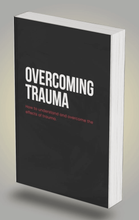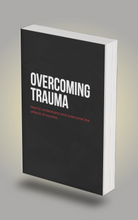Overcoming Trauma eBook Download
- Regular price
- $5.00
- Sale price
- $5.00
- Regular price
-
$10.00 - Unit price
- /per
Sale
Sold out
36 Page eBook download on a word document
8 Chapters
Introduction to Trauma
- Definition of Trauma: Explain what trauma is, including different types (emotional, physical, psychological).
- Causes of Trauma: Discuss common causes such as abuse, accidents, natural disasters, war, loss, and more.
- Signs and Symptoms: Detail how trauma manifests in both short-term and long-term behaviors and feelings.
Personal Stories and Experiences
- Survivor Stories: Feature individuals sharing their personal experiences with trauma and their journeys toward healing.
- Interviews with Experts: Include insights from psychologists, therapists, or counselors on their professional experiences with trauma patients.
- Impact on Daily Life: Discuss how trauma affects everyday activities, relationships, and mental health.
Coping Mechanisms and Healing Processes
- Therapeutic Approaches: Highlight various therapy methods such as Cognitive Behavioral Therapy (CBT), Eye Movement Desensitization and Reprocessing (EMDR), and others.
- Self-Care Strategies: Provide practical tips on self-care practices like mindfulness, meditation, exercise, and healthy eating.
- Creative Outlets: Showcase how art, music, writing, and other creative activities can help in the healing process.
Community and Support Systems
- The Role of Support Networks: Discuss the importance of family, friends, and support groups in overcoming trauma.
- Professional Help: Encourage seeking help from professionals and provide information on how to find the right therapist or counselor.
- Community Resources: Share information about local resources and organizations that support trauma survivors.
Moving Forward and Building Resilience
- Building Resilience: Talk about strategies to build resilience and reduce the impact of future traumatic events.
- Finding Meaning: Explore how individuals can find meaning and purpose after experiencing trauma.
- Setting Goals: Provide guidance on setting and achieving personal goals as part of the healing process.
Addressing Specific Populations
- Trauma in Children: Discuss how trauma affects children differently and ways to support young survivors.
- Cultural Considerations: Address how trauma is perceived and handled in different cultures.
- Trauma in Marginalized Communities: Explore the unique challenges faced by marginalized groups and the specific support they may need.
Call to Action
- Encouragement: End with a message of hope, encouraging viewers to seek help and take steps toward healing.
Shipping calculated at checkout.
Adding product to your cart
Use left/right arrows to navigate the slideshow or swipe left/right if using a mobile device





